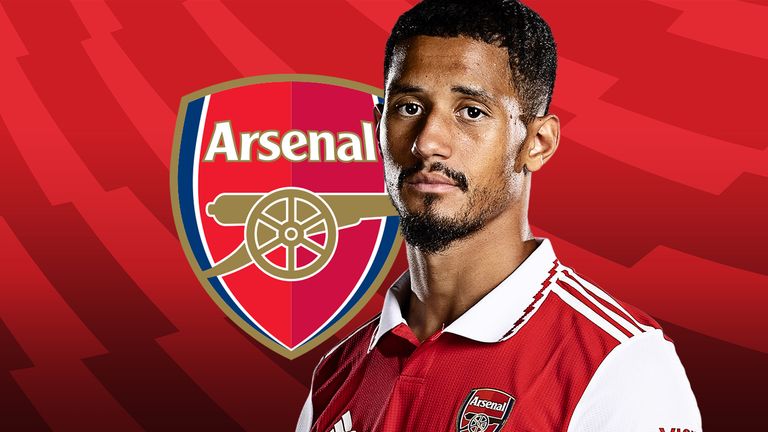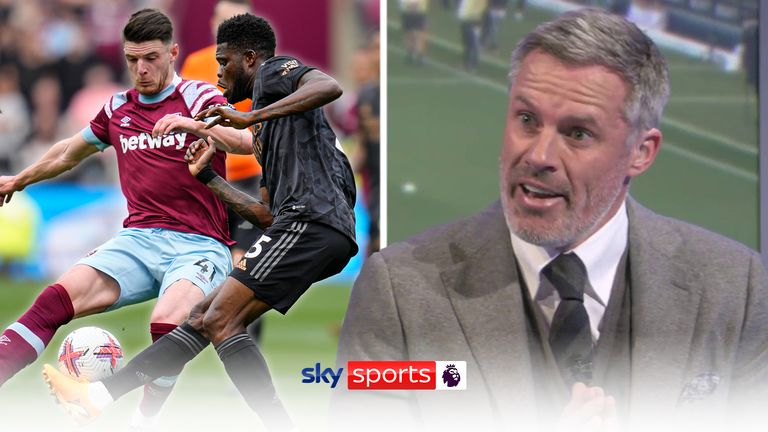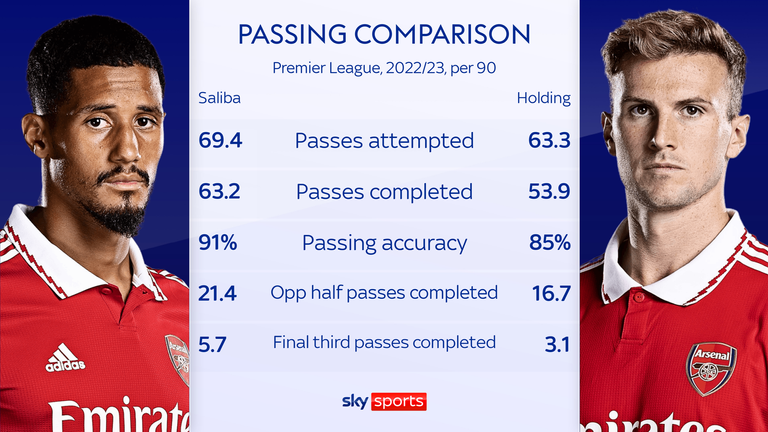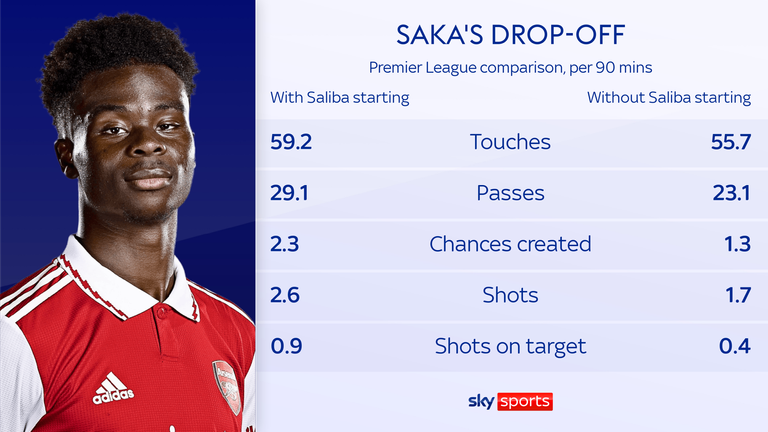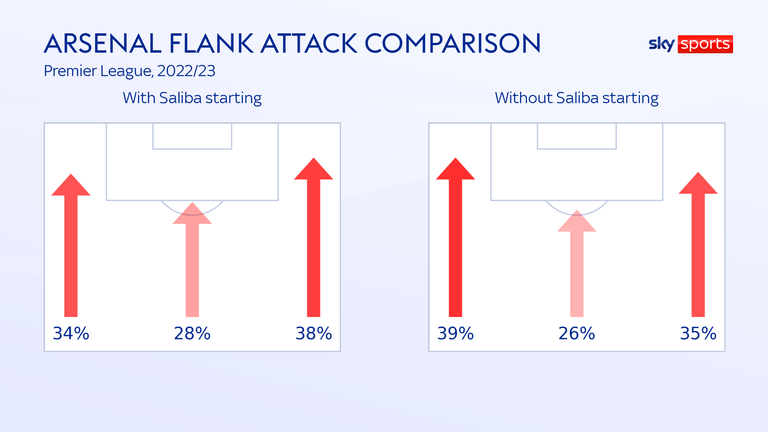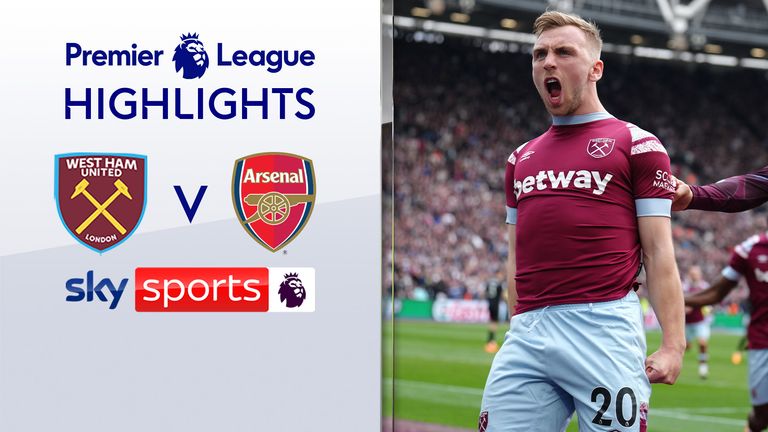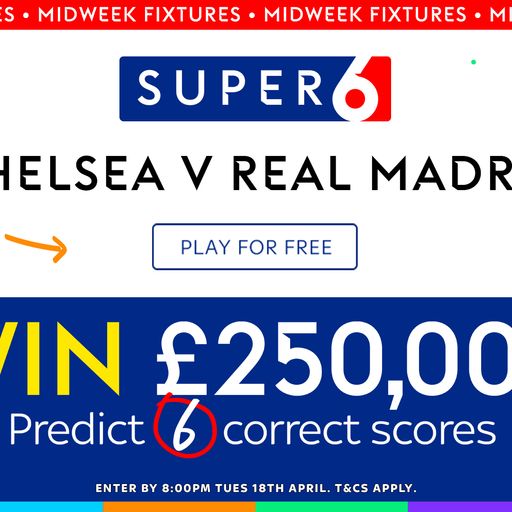William Saliba's absence hurting Arsenal offensively as well as defensively in Premier League title race with Man City
William Saliba had started every Premier League game for Arsenal this season before injuring his back; watch Arsenal vs Southampton live on Sky Sports Premier League and Sky Sports Main Event from 7pm on Friday Night Football; kick-off 8pm
Friday 21 April 2023 19:58, UK
Arsenal became only the fifth side in Premier League history to give up a two-goal lead in consecutive games with their 2-2 draw against West Ham at the London Stadium on Sunday.
The result prompted inevitable scrutiny of their character. Are Mikel Arteta's young side choking at a crucial point in the title race? It is an alluring narrative but it is not an accurate one.
If anything, Arsenal's character is an area of strength. They have won 15 points from losing positions this season - the second-most in the division. Before last week's trip to Anfield, they had only dropped four points from winning positions in their last 47 games.
On Monday Night Football, Jamie Carragher outlined the role of complacency, rather than a lack of bottle, in their recent wobble. But squad depth is another factor - in one position in particular.
- Watch Arsenal vs Saints with a NOW pass | Get Sky Sports
- Gary Neville's title-race advice to 'wobbling' Arsenal
- Would finishing second spell 'disaster' for Arsenal?
Rob Holding is a determined competitor whose character is deemed vital in the dressing room. But he is no William Saliba. There aren't many centre-backs at the level of the young Frenchman.
Trending
- Palace take early lead vs Arsenal LIVE!
- Tonali drills Newcastle in front against Brentford LIVE!
- Southampton vs Liverpool LIVE! & highlights
- World Darts Championship LIVE! Aspinall headlines Ally Pally action
- WCL: Arsenal host Bayern after Man City lose top spot to Barca LIVE!
- Usyk vs Fury 2 workouts and live fights: free stream and updates
- Transfer Centre LIVE! 'Saudi could offer Rashford way out of Man Utd'
- Perez leaves Red Bull seat as 2025 exit confirmed
- Man Utd latest: Rashford has not travelled for Carabao Cup tie - reports
- World Darts Championship schedule: Aspinall in action on Wednesday
Saliba has, as such, been sorely missed to the right of Gabriel Magalhaes in Arsenal's defence in recent weeks. His absence, due to a back injury from which he is recovering slower than expected, was felt more acutely than ever on Sunday.
Holding struggled to cope with the speed and physicality of Michail Antonio, whose runs in behind caused the kind of problems Saliba, a player who excels on both fronts, is adept at solving.
He was fortunate to avoid a yellow card when he hacked down Antonio on the edge of his own box on 19 minutes and the incident set the tone for an individual battle which had one clear winner.
In the end, the game proved to be the fourth in a row in which Arsenal have failed to keep a clean sheet since Saliba's injury. But Holding has mostly defended well. It is in fact in possession, rather than out of it, that the gulf between the 27-year-old and the man he is replacing is widest, and it is in that respect that Arsenal have struggled most in the last two games.
At Anfield, they did not muster a single shot between their second goal, scored by Gabriel Jesus in the first half, and Martin Odegaard's speculative long-range effort in the 74th minute.
At the London Stadium on Sunday, the pattern was similar. There were nearly 40 minutes left to play when Jarrod Bowen pulled the hosts level but Arsenal only managed three efforts on goal in that time. They never really looked like scoring.
Complacency undoubtedly played a part. "We got too comfortable," said Arteta. But there was also a lack of threat and fluency in possession stemming from the back, where the man deputising for Saliba is unable to replicate his crucial role in Arsenal's build-up play.
The numbers prove it.
Holding attempts fewer passes than Saliba and completes fewer still, his accuracy rate standing at 85 per cent compared to Saliba's 91 per cent, an average which puts him behind only a few players in the Premier League, most of them from Manchester City.
It is important to consider where those passes are directed as well as whether they reach their targets.
Saliba is a proactive, forward-thinking defender who has been invaluable in allowing Arsenal to play in their opponents' half this season. Holding, by contrast, is at his best when defending his box.
He sends far fewer passes into dangerous areas than Saliba and, like Kieran Tierney, another squad player called into action against West Ham, following an injury to the similarly important Oleksandr Zinchenko, he is also prone to losing composure on the ball under pressure.
That can be seen in the fact Holding sends nearly twice as many passes long (7.4 per 90 minutes) as Saliba (4.3 per 90 minutes). The success rate of those passes this season is under 50 per cent.
Holding's shortcomings on the ball become even clearer when breaking down which team-mates he has passed to this season - an exercise which also helps to explain Arsenal's recent issues in attack.
Saliba, as well as providing invaluable defensive cover behind Ben White, has been key to the offensive potency of Arsenal's right side, his distribution helping Saka and Odegaard excel to such an extent that they are both player-of-the-year contenders.
It is no coincidence their form has dipped during Saliba's absence. Without him, they are not getting the same service, the carefully choreographed patterns of play - many of which start with Saliba - thrown out of kilter by the change in personnel.
Indeed, while Saliba looks to that right side to get Arsenal playing, Holding, as well as being less ambitious with his passing generally, is much more inclined to look infield.
According to Opta, he plays roughly half as many passes to right-back White as Saliba - 8.2 per 90 minutes to his team-mate's 15 - and an even lower proportion to Saka, finding the 21-year-old with only 1.2 passes per 90 minutes on average.
Holding also sends fewer passes to Odegaard, Arsenal's right-sided No 8, and, even more tellingly, compared to Saliba, he looks for goalkeeper Aaron Ramsdale with greater frequency too.
The change has impacted Saka most profoundly. Even factoring in his two-goal display against Crystal Palace, Arsenal's first fixture without Saliba, his output has declined. He is not getting as many touches, creating as many chances or taking as many shots.
Arteta has sought to adapt to the changing circumstances by switching the focus to the opposite flank. His side are now sending a higher proportion of attacks down the left than the right.
This change has been facilitated, in part, by the return to fitness of Gabriel Jesus, whose natural inclination is to drift to the left, where he frequently interchanges positions with Martinelli.
Between them, the Brazilians have contributed six goals and three assists in the four games Saliba has missed, showing their capacity, as a pair, to raise the threat level from Arsenal's left flank.
Arsenal's right flank, though, while not entirely blunted - the opening goal against West Ham, for example, came when Jesus converted from White's low cross - is undoubtedly weaker than it was and that is a headache for Arteta.
Saliba's injury is particularly unfortunate given its timing, with Takehiro Tomiyasu's season-ending knee problem, suffered just minutes earlier in the game against Sporting Lisbon, leaving Arteta without the option of moving White, whose distribution from the back is a strength, across to his more natural position.
His absence is further compounded by the recent muscular injury to Zinchenko, another defensive player whose ball-playing ability, albeit on the opposite side, has been vital in helping Arsenal control games and break down stubborn opponents this season.
What happens next, and how Arsenal continue to adapt, may be decisive. Their excellent start against West Ham, following a similarly strong start at Anfield, shows they are still capable of causing their opponents serious problems even in their current guise.
But, with Manchester City to come after Southampton, the impact of Saliba's absence - in an offensive sense even more than defensively - and how quickly Arsenal are able to get him back to fitness, may ultimately prove key to the outcome of the title race.
Watch Arsenal vs Southampton live on Sky Sports Premier League and Main Event from 7pm on Friday Night Football; kick-off 8pm

